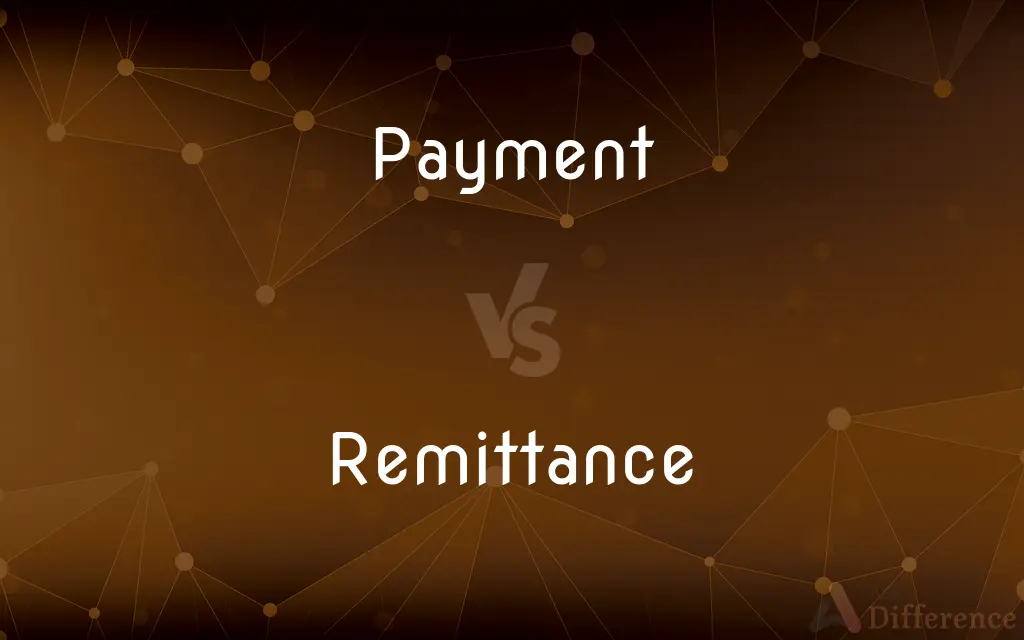Payment vs. Remittance — What's the Difference?
By Tayyaba Rehman — Updated on September 17, 2023
Payment refers to the act of paying, often for goods or services, while Remittance is money sent, usually across distances, often to another person as an obligation.

Difference Between Payment and Remittance
Table of Contents
ADVERTISEMENT
Key Differences
Payment and Remittance are both related to the transfer of money, but their contexts differ. Payment generally refers to the money given in exchange for a product, service, or to settle a debt. It's a broad term that encompasses various transactions. Remittance, on the other hand, specifically pertains to money sent to another person or place, often across geographical distances.
When you purchase an item at a store, you make a Payment for that item. This exchange is direct and immediate. Conversely, if you're working in one country and sending a portion of your earnings back to your family in another country, that would be considered a Remittance.
Payments can be made in various forms - cash, check, credit card, or digital transfers. They are ubiquitous and can be found in daily transactions, monthly bills, or periodic obligations. Remittance, while also versatile in its payment methods, often involves specific services or channels that facilitate the transfer of money across borders or to distant locations.
In business contexts, when a company receives an invoice from a supplier, they make a Payment to settle that invoice. In contrast, if that company has a branch overseas and needs to transfer funds to that branch, the funds sent would be termed a Remittance.
Both Payment and Remittance are essential components of the financial ecosystem. While Payments facilitate commerce and daily transactions, Remittances play a significant role in supporting economies, especially in regions where receiving money from abroad is a primary source of income for many families.
ADVERTISEMENT
Comparison Chart
Primary Focus
Money for goods/services or debts
Money sent to another person/place
Context
Broad, everyday transactions
Specific, often cross-border or distant transactions
Immediate Exchange
Often direct and immediate
Might involve intermediaries or delays
Business Usage
Settling invoices, paying salaries
Transferring funds between branches, overseas transactions
Economic Role
Facilitates commerce
Supports economies, familial support
Compare with Definitions
Payment
Settling a debt or obligation.
She completed her car loan Payment.
Remittance
A payment method for sending money over distances.
The Remittance arrived in his account after three days.
Payment
Money given in exchange for goods or services.
I made the Payment for my groceries.
Remittance
Transferring funds, especially across borders.
The monthly Remittance supports his family's expenses.
Payment
The act of paying.
Payment is due at the end of the month.
Remittance
Money sent to another person or place.
She sent a Remittance to her family overseas.
Payment
An amount paid.
The Payment for the concert ticket was $50.
Remittance
A remittance is a non-commercial transfer of money by a foreign worker, a member of a diaspora community, or a citizen with familial ties abroad, for household income in their home country or homeland. Money sent home by migrants competes with international aid as one of the largest financial inflows to developing countries.
Payment
A reward or recompense.
He received Payment for his hard work.
Remittance
The sending of money to someone at a distance.
Payment
An amount paid
Received a large payment.
Remittance
The sum of money sent.
Payment
A payment is the voluntary tender of money or its equivalent or of things of value by one party (such as a person or company) to another in exchange for goods, or services provided by them, or to fulfill a legal obligation. The party making a payment is commonly called the payer, while the payee is the party receiving the payment.
Remittance
The act of sending money to someone.
Payment
The act of paying or the state of being paid.
Remittance
Money which is sent to someone, typically to someone in another country.
Payment
One's due, reward, or punishment; requital.
Remittance
Money sent by a foreign worker back to their home country.
Payment
(uncountable) The act of paying.
Remittance
The act of transmitting money, bills, or the like, esp. to a distant place, as in satisfaction of a demand, or in discharge of an obligation.
Payment
(countable) An instance of that act; a sum of money paid in exchange#Noun for goods or services, or the transaction#Noun that conveys it.
Remittance
The sum or thing remitted.
Payment
The act of paying, or giving compensation; the discharge of a debt or an obligation.
No man envieth the payment of a debt.
Remittance
A payment of money sent to a person in another place
Payment
That which is paid; the thing given in discharge of a debt, or an obligation, or in fulfillment of a promise; reward; recompense; requital; return.
Remittance
The act of remitting or sending money.
Remittance services charge a fee for transactions.
Payment
Punishment; chastisement.
Remittance
A sum of money sent as an obligation or gift.
The Remittance from her son helped cover medical bills.
Payment
A sum of money paid
Payment
The act of paying money
Common Curiosities
Is every Remittance a Payment?
Yes, every Remittance is a type of Payment, but not every Payment is a Remittance.
Are Remittances always sent overseas?
No, while often cross-border, Remittances can also be sent domestically over distances.
Are Remittances only for familial support?
No, while familial support is common, Remittances can also be for business or other purposes.
Can Payments be international?
Yes, Payments can be international, similar to Remittances.
Is Payment immediate?
Payments can be immediate, but some methods might involve processing times.
Can I make a Payment online?
Yes, many Payments today are made online or electronically.
Are Remittances subject to fees?
Often, especially when using specific Remittance services or when sending money internationally.
Why are Remittances important for some economies?
Remittances can be a primary source of income and foreign currency for some countries.
Can a Payment be in forms other than money?
Typically, Payments are monetary, but the term can refer to other forms of exchange in some contexts.
Can a Payment be delayed?
Yes, depending on the method and agreement, some Payments may have delayed processing.
Is Remittance only about sending money?
Primarily, but Remittance can also refer to the act or payment method of sending money.
Do all businesses require Payments electronically?
No, while many prefer electronic Payments, some businesses still accept cash or checks.
What's a popular method for sending Remittances?
Services like Western Union or digital apps are commonly used for Remittances.
Are Remittances taxable?
Depending on the region and amount, Remittances might be subject to taxes or reporting requirements.
What happens if a Payment bounces?
There may be fees, and the recipient won't receive the funds. The payer will need to resolve the issue.
Share Your Discovery

Previous Comparison
Commonize vs. Communize
Next Comparison
Sclera vs. ConjunctivaAuthor Spotlight
Written by
Tayyaba RehmanTayyaba Rehman is a distinguished writer, currently serving as a primary contributor to askdifference.com. As a researcher in semantics and etymology, Tayyaba's passion for the complexity of languages and their distinctions has found a perfect home on the platform. Tayyaba delves into the intricacies of language, distinguishing between commonly confused words and phrases, thereby providing clarity for readers worldwide.
















































